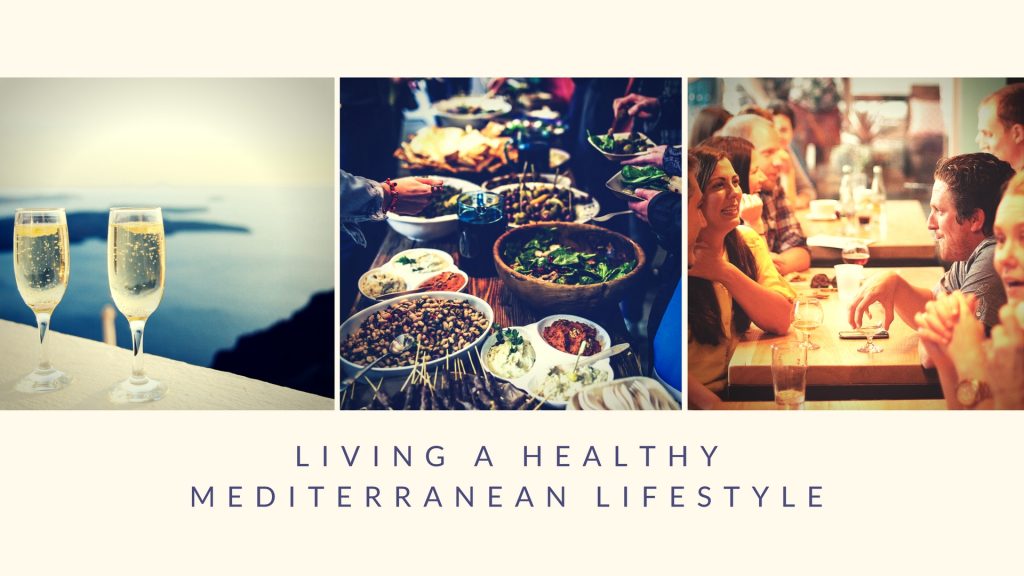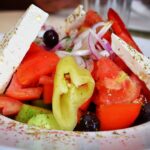More and more people are beginning to want to know what the Mediterranean lifestyle is all about and why it’s recommended by many health experts.
Here we go. Another article about diets. And if you’re anything like me, you’ve probably tried most of them.
There’s the Atkins Diet. The Zone Diet. And the Blood-Type Diet. Have you tried to go Paleo? Or my personal favorite…The Cabbage Soup Cleanse.
I don’t know about you, but I’m about tired of all the fad diets.
And yet, here I am, writing an article about the Mediterranean Diet. Isn’t it just another fad?
Actually, no.
The Mediterranean Diet isn’t really a “diet” at all! This way of eating has been around since the time of Ancient Rome. Because of it’s prevalence throughout history, Mediterranean and Arabic food choices should really be seen more as a lifestyle than a diet.
“The Mediterranean Diet is a lifestyle, not just another fad.” Did you know…
Mediterranean cuisine was the foundation of the famous U.S. food pyramid and dietary recommendations!
How was it discovered ?
In the 1950s, an American scientist named Ancel Keys discovered a small town called Pioppi. This was a small, southern Italian town. The people lived simply and didn’t have any wealth to speak of. Nothing to make them stand out. Except for one thing.
All the members of the town were in extremely good health.
During a time in America when heart disease and stroke rates soared, these people didn’t suffer from either. And although they weren’t monitoring caloric intake, they didn’t struggle with obesity. Their life expectancy was much higher than that of the most well-fed, wealthiest citizens of New York City.
This discovery inspired Keys to conduct an extensive study on differing cuisines across the globe. One of the diets he discovered was what we know today as the “Mediterranean Diet”, which included Mediterranean and Arabic inspired dishes. This lifestyle revolutionized the way we look at food today.
It’s changed our health too! The Mediterranean and Arabic Lifestyle has proven to reduce risk or heart disease, chronic illnesses, type-2 diabetes, Alzheimer’s and Parkinson’s diseases, while improving quality of life and longevity.
According to the US News & World Report, Mediterranean and Arabic healthy eating choices took first place as the easiest to maintain. They were also ranked as the second best known diet choices overall.
So what makes a Mediterranean Lifestyle?
There are some basic guidelines to follow in order to maintain these healthy eating choices. The experts at the Iranian Journal of Public Health published a study with the US National Library of Medicine, outlining the basics of the diet.
Here are the details for food groups and portioning for a healthy Mediterranean lifestyle.

The diet of people that live a healthy Mediterranean lifestyle is made up of between 45 – 65% carbohydrates.
Carbohydrates are things like rice, potatoes, and starchy fruits and vegetables.
By following this guideline, this means than in a 2000 calorie per day diet, 1100 calories should be in carbs.
That’s a lot of carbs!
There aren’t many diets that recommend this amount of carbohydrates. This is why most of those diets fail.
Carbohydrates are actually very important! They are the main source of energy in the body. Without carbohydrates, the body would use start using protein for energy. While that may not sound like such a bad thing, protein is needed in other places for tissue repair and enzyme production, which allow for better digestion and absorption of our foods.
Believe it or not, eating carbs actually enables us to burn fat and lose weight, too.
The secret to eating carbs is making sure you’re eating the right ones.
Most of American’s tend to eat simple carbohydrates. These take the form of processed sugars and sweeteners, white flower, donuts, cookies, and even fruits.
These are not the best choices. Why?
This is because they are already highly processed and simple. The body is able to digest and absorb these very quickly. This then causes sudden spikes in blood sugar, which is hard on the body. In addition, this also leads to weight gain because there is so much sugar at one time, the body ends up storing the excess as fat. Overtime, this will lead to permanent damage that can cause diabetes.
However, there is a second type of carbohydrate.
These carbohydrates are called complex carbohydrates, also known as starches. These take the form as sweet potatoes, brown rice, whole grains, and starchy fruits and vegetables.
Why are they better?
These carbs are unprocessed and high in fiber, forming complex molecules. This means the body takes longer to digest them, allowing the sugars to be released over time in a way the body can keep up with and use throughout the day. The added fiber contributes to the slow digestion, as well as helping us feel full longer.
Because of this, at least 80% of carbohydrates (about 880 calories) need to be complex carbs, or starches. while simple carbs should be kept under 20% (only 220 calories).
So what types of carbs are part of a mediterranean lifestyle?
Many mediterranean eaters enjoy healthy whole wheat pastas. Whole wheat pitas and flatbreads are served along side delicious hummus. Tabouli is accentuated by whole grains. In addition, many dishes are wholly vegetarian, with healthy fibers and carbs coming from the eggplant in baba ganoush and brown rice and veggies in stuffed grape leaves.
That doesn’t sound much like a diet, does it?
But wait, what about desserts?!
In most countries living a true mediterranean lifestyle, you wont see many sugary items. Most of their simple sugars come from fresh fruits, natural honey, and wines.
But, that really doesn’t sound too bad.

The diet of people that live a healthy Mediterranean lifestyle is made up of between 20 – 35% fats. Fats are things like olive oil, butter, and animal fats.
By following this guideline, this means that in a 2000 calorie per day diet, 500 calories should be in fats.
I know, this seems like a lot.
However, the body has many uses for good healthy fats. They are used for cell membrane structure, the transport and absorption of vitamins, blood clotting, muscle movements, nerve protection, and natural steroid production.
There are also many essential unsaturated fats which the body cannot make itself and can only get in foods which aid in joint and brain health.
While fats are often demonized by fad diets, they are actually the key to maintaining healthy eating!
Have you ever left the table feeling unsatisfied and craving more? It could be that there weren’t enough fats. Fats are what help you feel satisfied. They also help make dishes savory and flavorful.
However, not all fats are created equal!
Maintaining a healthy Mediterranean lifestyle is completely dependent on the use of unsaturated fats, rather than saturated fats.
How can you tell the difference?
Saturated fats will be solid at room temperature. Like butter, animal fats, or coconut oil. While, unsaturated fats are liquids at room temperature. Like olive, flaxseed, or vegetable oil.
Why unsaturated fats?
Unsaturated fats are easier for the body to digest. The way they are broken down during digestion makes them perfect candidates for the construction of good cholesterol (HDL). In contract, saturated fats are more difficult for the body to digest and leave behind remnant molecule waste that is used to construct bad cholesterol molecules (LDL).
Very simply, unsaturated fats lower your bad cholesterol and keep your heart healthy!
Mediterranean and Arabic food is full of unsaturated fats. One of the healthiest unsaturated fat sources is olive oil. With rare exceptions, the base of every mediterranean dish starts with onions and garlic sautéed in olive oil. Dressings for salads and tabouli all rely on extra virgin olive oil to give them a fruity, yet savory finish. You would be hard pressed to find a dish in Mediterranean and Arabic cuisine without olive oil at its core.
Being right on the mediterranean sea, this cuisine also is full of delicious seafood. While this is mainly a source of protein (which we talk about below), it is also a great source of unsaturated fats, in the form of omega-3 and omega-6 fatty acids, which are essential for brain health.
Another great source of unsaturated fats is nuts. While nuts can simply be eaten by the handful, they’re integrated most famously into Mediterranean cuisine in the form of baklava. And while this may not be the healthiest dish, it’s use of nuts and natural sweeteners makes this another source of health benefits, albeit in moderation.
“Baklava is a health food! (…in moderation…) #delicious”

The diet of people that live a healthy Mediterranean lifestyle is made up of between 10 – 35% proteins. Proteins are foods like chicken, beef, fish, and beans.
By following this guideline, this means that in a 2000 calories per day diet, 400 calories should be in proteins.
This is very different from the current Western diet. The percentage of animal proteins in the average American diet is doubled!
The diet of those living a Mediterranean lifestyle includes proteins in a small percentage. There are two type of proteins.
Animal Proteins
60% of the overall protein intake should be animal proteins. In calories, this would be about 240 calories per day. This is because animal proteins include animal fats, which are mostly made up of saturated fats. As we discussed above, this will increase bad cholesterol in the body. They also tend to be a bit more difficult for the body to digest. However, there are also many benefits of including animal products into the diet.
The benefits of animal proteins?
- Essential Amino Acids
- Essential Fatty Acids
- Fiber
- Minerals
What types of animal proteins are included in Mediterranean cuisine?
Mediterranean cuisine includes mostly fish and white meat proteins, such as chicken. Only a small amount of red meat (beef or lamb) is included. The true mediterraneanan lifestyle only includes these foods a few times per month.
Plant-Based Protein
Mediterranean food is known for it’s high concentration of healthy plant-based proteins as well. Legumes make up delicious hummus, falafels, and lentil dishes.

Now that we’ve discussed all the details of what characterizes a “Mediterranean Diet”, let’s talk about some of the health benefits inherent in the cuisine.
Mediterranean and Arabic foods are full of vitamins and antioxidants. Here are a few examples:
Garlic
Garlic is known as a “super food”, and rightly so! Many of the vitamins and compounds found in garlic have been known to fight heart disease and even cancer! It serves as a powerful, natural antibiotic and has been used throughout the ages to fight off various diseases.
Spices
Mediterranean dishes are recognized by their distinctive spices. Saffron, nutmeg cinnamon, ginger, cloves, rosemary, thyme, basil, dill, mint, sumac, and allspice make up some of the most recognizable. These herbs have been recognized to hold many health properties. According to many studies, they have been known to reduce risk of diabetes, inflammation, and high blood pressure. Spices and herbs have powerful healing properties that should not be overlooked.
Fruits
Fruits have powerful antioxidants and vitamins. These work to reduce the risk of cancer and diseases by fighting free radical damage throughout the body. Antioxidants from plant food also serve to fortify the immune system.
This is what takes the food and turns it into a lifestyle.
In his journals, Ancel Keys, the discoverer of the Mediterranean lifestyle, noted something significant about the day-to-day lives of the Pioppi residents. He made note of the strong family ties of the people. Most families lived together in one home with multiple generations. Grandparents, parents, and children all lived under one roof. He noted that the people of this town made up a community. Each person gave to their neighbor and cared for one another.
They often came together to cook, eat, and enjoy what they had.
Today, most psychologists agree that eating with family and friends is an important part of developing and maintaining emotional stability and security. According to Cody C. Delistraty of The Atlantic, eating together gives an opportunity to de-stress, reconnect with our loved ones, and build better relationships.
That is the goal of the Mediterranean lifestyle.
“Mediterranean cuisine promotes health in what we put into our bodies, minds, and hearts. #healthylifestyle”
This is what takes the food and turns it into a lifestyle.
About the Author: Joy Becerra helps companies accomplish more. She is also a lover of food and fancies herself an amateur chef. She serves as a professional writer and social media expert with Go Hyper Local and Pici & Pici Inc.










28 Responses
Very interesting to read you
Good luck to you
Not many can comprehend these types of ideas, fortunate I consider the author one of them.
Can I put some of this on my blog basically incorporate a backlink to this web site?
Yes, you can! Thank you for your support.
I sincerely took delight in reading your site, you explained some first-rate points. I want to bookmark your post. I saved you to delicious and yahoo bookmarks. I will attempt to revisit to your site and examine more posts.
Working every day by day I’m a lot more impressed by your post. Thanks for your personal efforts with expressing the following theme.
These kind of post are always inspiring and I prefer to read quality content so I happy to come across many superior point here in the post, writing is simply great, thank you for the post
This is my first time I have visited your site. I found a lot of interesting stuff in your blog. From the tons of comments on your posts, I guess I am not the only one! keep up the great work.
Hello. fantastic job. I did not imagine this. This is a remarkable story. Thanks!
I was recommended this blog by way of my cousin. I’m now
not sure whether this publish is written by way of him as nobody else recognize such special approximately my problem.
You are wonderful! Thank you!
Absolutely with you it agree. Idea good, I support.
This article should be in the Mayo Clinic website.
Okay. Cool! I think I want to eat Mediterranean diet recipes now! Not only do they look good, but nutritious too! Not sure if they taste good, but I will just try. Who knows? I might like it.
Very interesting information you provided!
I appreciate you sharing this article.Thanks Again. Much obliged.
Thanks for sharing, this is a fantastic post.Really looking forward to read more. Will read on…
Maybe one day I will write a book based on this perfect writing. Great job really.
It not absolutely that is necessary for me. There are other variants?
What do you mean? Variants?
I like the helpful information you supply to your articles.
I will bookmark your blog and take a look at once more right here regularly.
I am moderately certain I will be told a lot of new stuff right
here! Best of luck for the following!
Excellent post!
Very interesting facts presented in this article!
Thanks for sharing this article!
Hello people! I like this blog. Bye!
Great article!
One hundred percent!!!
I just want to say thank you for this great website. I found a solution here on avalon-pockets.com for my issue.
We’re glad we could help. Hope you come back and enjoy reading our articles!